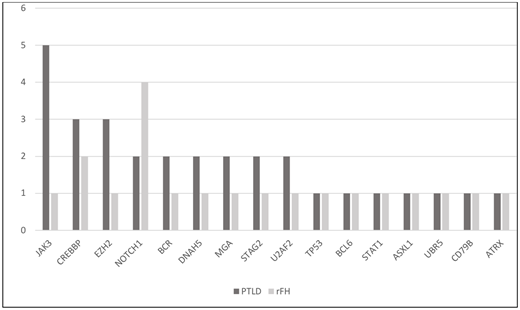Post-transplant lymphoproliferative disorders (PTLD) are diverse in morphology, immunophenotype and clinical outcomes, occurring in immune compromised patients after hematopoietic stem cell transplantation (HCT) or single organ transplantation (SOT). Predicting the outcome of PTLDs is complex. In most of cases PTLD is driven by Epstein-Barr virus (EBV) infection, though the etiology of EBV negative cases is unknown. There have been only few studies investigating the mutational landscape and gene expression of PTLD.
In our study we performed targeted DNA deep sequencing and RNA expression profiling (RNA-Seq) on the hematopoietic lymphoid tissues of 15 post-transplant patients with PTLD and 16 post-transplant patients with follicular hyperplasia (FH) after HCT or SOT.
Recurrent mutations in JAK3 were identified in five of 16 PTLD cases and one of 16 follicular hyperplasia cases. We additionally identified mutations in the PIK3CD gene in four PTLD cases and NOTCH1 mutations in 2 PTLD and four FH cases. 17 other genes were commonly mutated in both groups. Gene expression profiles differed between both groups. Genes involved in regulating the immune system were unregulated in PTLD. We also saw a stronger expression of T-cells and a weaker expression of B-cells within the PTLD group when compared with FH.
Our findings suggest an important role for immune regulatory pathways in the pathogenesis of PTLD, with the JAK/STAT pathway being a central recurrent key metabolic pathway.
Ohgami:Agilent technologies: Other: received support/funding.
Author notes
Asterisk with author names denotes non-ASH members.


